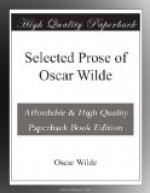THE THRONE ROOM
It was a throne-room, used for the reception of foreign ambassadors, when the King, which of late had not been often, consented to give them a personal audience; the same room in which, many years before, envoys had appeared from England to make arrangements for the marriage of their Queen, then one of the Catholic sovereigns of Europe, with the Emperor’s eldest son. The hangings were of gilt Cordovan leather, and a heavy gilt chandelier with branches for three hundred wax lights hung down from the black and white ceiling. Underneath a great canopy of gold cloth, on which the lions and towers of Castile were broidered in seed pearls, stood the throne itself, covered with a rich pall of black velvet studded with silver tulips and elaborately fringed with silver and pearls. On the second step of the throne was placed the kneeling-stool of the Infanta, with its cushion of cloth of silver tissue, and below that again, and beyond the limit of the canopy, stood the chair for the Papal Nuncio, who alone had the right to be seated in the King’s presence on the occasion of any public ceremonial, and whose Cardinal’s hat, with its tangled scarlet tassels, lay on a purple tabouret in front. On the wall, facing the throne, hung a life-sized portrait of Charles V. in hunting dress, with a great mastiff by his side, and a picture of Philip II. receiving the homage of the Netherlands occupied the centre of the other wall. Between the windows stood a black ebony cabinet, inlaid with plates of ivory, on which the figures from Holbein’s Dance of Death had been graved—by the hand, some said, of that famous master himself.
But the little Dwarf cared nothing for all this magnificence. He would not have given his rose for all the pearls on the canopy, nor one white petal of his rose for the throne itself. What he wanted was to see the Infanta before she went down to the pavilion, and to ask her to come away with him when he had finished his dance. Here, in the Palace, the air was close and heavy, but in the forest the wind blew free, and the sunlight with wandering hands of gold moved the tremulous leaves aside. There were flowers, too, in the forest, not so splendid, perhaps, as the flowers in the garden, but more sweetly scented for all that; hyacinths in early spring that flooded with waving purple the cool glens, and grassy knolls; yellow primroses that nestled in little clumps round the gnarled roots of the oak-trees; bright celandine, and blue speedwell, and irises lilac and gold. There were grey catkins on the hazels, and the foxgloves drooped with the weight of their dappled bee-haunted cells. The chestnut had its spires of white stars, and the hawthorn its pallid moons of beauty. Yes: surely she would come if he could only find her! She would come with him to the fair forest, and all day long he would dance for her delight. A smile lit up his eyes at the thought, and he passed into the next room.




